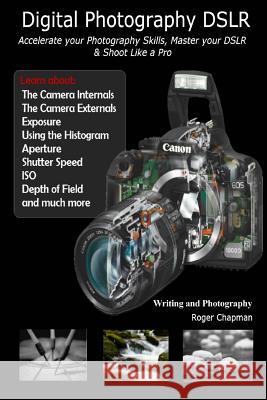Digital Photography DSLR: Accelerate your Photography Skills, Master your DSLR & Shoot Like a Pro » książka
Digital Photography DSLR: Accelerate your Photography Skills, Master your DSLR & Shoot Like a Pro
ISBN-13: 9781494398163 / Angielski / Miękka / 2013 / 62 str.
Digital Photography DSLR So you want to learn about digital photography. 'Digital Photography - DSLR' has been is written for those who want to learn digital photography. It covers all of the basic digital photography techniques. When you are learning digital photography it is vital that you understand the digital photography basics so that even with an entry level DSLR you can produce sound pictures, both technically and creatively. For the purpose of this book, which is basically a guide to digital photography, I will be using images shot with my Canon 350D. Some were taken with the 18 - 55mm kit lens and some with the upgraded Canon EFS 17 - 85mm, I chose to use my old 350D to simply demonstrate that you do not need to own the most expensive kit to be able to take great pictures. Through the use of both lenses I cover the majority of the basic digital photography techniques, and these techniques explained here apply to all makes of camera. It is only when you get to the prosumer level that things need to be explained on an individual camera basis. When I started taking photographs back in the days of film there were certain basics that had to be understood in order to produce a good photograph and the same basics apply to the digital photography cameras of today. No matter how clever they get the real photographer will always want to take creative control into their own hands and so there is an inherent need to understand exposure, the histogram, aperture, shutter speeds, ISO, depth of field, the relationship between shutter speed, exposure and aperture, focus, focal plane in relation to aperture and of course how to frame the shot. The purpose of this book is not to focus (excuse the pun) on any one specific genre of photography, such as portrait or landscape photography, but to give a solid grounding in the basics required to produce a good picture. Below is a list of the subjects covered however other information will no doubt creep in as I get over enthusiastic about certain subjects. To put your mind at ease a lot of what I am about to explain did not come easy to me and I totally understand some of the frustration you are experiencing or will experience in the future as you learn the art of photography. I believe it is important to remember one thing above all else and that is: 'The word "photography" comes from two Greek words, photo- meaning light and graph - meaning draw', so you are literally 'Drawing with Light'. Personally I think that is rather beautiful and when I get frustrated it helps me to remember that photography is not just a mechanical process. I wish you the best with your endeavours and I hope this book goes some small way in helping you to achieve your goals with your DSLR. Roger Chapman
Zawartość książki może nie spełniać oczekiwań – reklamacje nie obejmują treści, która mogła nie być redakcyjnie ani merytorycznie opracowana.











